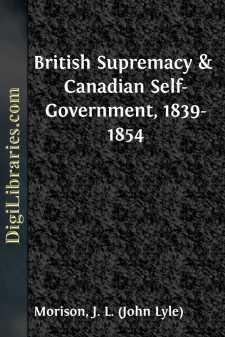Categories
- Antiques & Collectibles 13
- Architecture 36
- Art 48
- Bibles 22
- Biography & Autobiography 813
- Body, Mind & Spirit 142
- Business & Economics 28
- Children's Books 14
- Children's Fiction 11
- Computers 4
- Cooking 94
- Crafts & Hobbies 4
- Drama 346
- Education 46
- Family & Relationships 57
- Fiction 11829
- Games 19
- Gardening 17
- Health & Fitness 34
- History 1377
- House & Home 1
- Humor 147
- Juvenile Fiction 1873
- Juvenile Nonfiction 202
- Language Arts & Disciplines 88
- Law 16
- Literary Collections 686
- Literary Criticism 179
- Mathematics 13
- Medical 41
- Music 40
- Nature 179
- Non-Classifiable 1768
- Performing Arts 7
- Periodicals 1453
- Philosophy 64
- Photography 2
- Poetry 896
- Political Science 203
- Psychology 42
- Reference 154
- Religion 513
- Science 126
- Self-Help 84
- Social Science 81
- Sports & Recreation 34
- Study Aids 3
- Technology & Engineering 59
- Transportation 23
- Travel 463
- True Crime 29
British Supremacy & Canadian Self-Government, 1839-1854
Description:
Excerpt
PREFACE
The essay which follows had been printed, and was on the point of being published, when the outbreak of war involved my venture in the general devastation from which we are only now emerging. More than four years of military service lie between me and the studies of which this book is the summary. It was written under one dispensation; it is being published under another. My first impulse, therefore, was to ask whether the change which has rendered so much of the old world obsolete had not invalidated also the conclusions here arrived at. But reflection has simply confirmed me in the desire to complete the arrangements for publication. Self-government is the keynote of the essay, and it is unlikely that self-government will cease to be the central principle of sane politics either in the British Empire or in the world outside. I watched a Canadian division coming out of the last great battle in France, battered and reduced in numbers, but with all its splendid energy and confidence untouched. The presence of the Canadians there, their incomparable spirit and resolution, the sacrifices they had just been making, with unflinching generosity, for the Empire, seemed only the last consequences of the political struggle for autonomy described in the pages which follow. They would have been impossible had the views of all the old imperialists from Wellington to Disraeli prevailed.
The material on which this volume is based falls into three groups. First in importance are the state papers and general correspondence of the period, contained in the Canadian Archives at Ottawa. In addition to the correspondence, ordinary and confidential, between the Secretaries of State for the Colonies, and the Governors-General, from 1839 to 1867, I read two very notable collections, designated in the foot-notes the Bagot Correspondence and the Elgin-Grey Correspondence. In the former are contained not only Bagot's private correspondence with Lord Stanley, but also letters from Bagot's British friends and Canadian political advisers. These constitute the most important evidence which exists for Bagot's year of office. In the same way, the private correspondence, carried on between Earl Grey and the Earl of Elgin from 1847 to 1852, takes precedence of all other Canadian material of that period; and is, indeed, the most enlightening series of documents in existence on mid-Victorian Colonial policy.
The second group is composed of pamphlets and early newspapers, more especially the admirable collection of pre-confederation pamphlets in the Archives at Ottawa, and the Bell and Morris collections at Queen's University. Kingston. I cannot pretend to have mastered all the material supplied by the newspapers of the period; but I have attempted to work through such representative journals as the Toronto Globe, the Montreal Witness, and the Kingston papers published while Kingston was capital of the united Provinces. I consulted certain others, French and English, on definite points of political interest, such as the reappearance of Papineau in politics in 1847....


